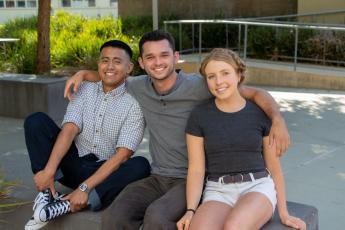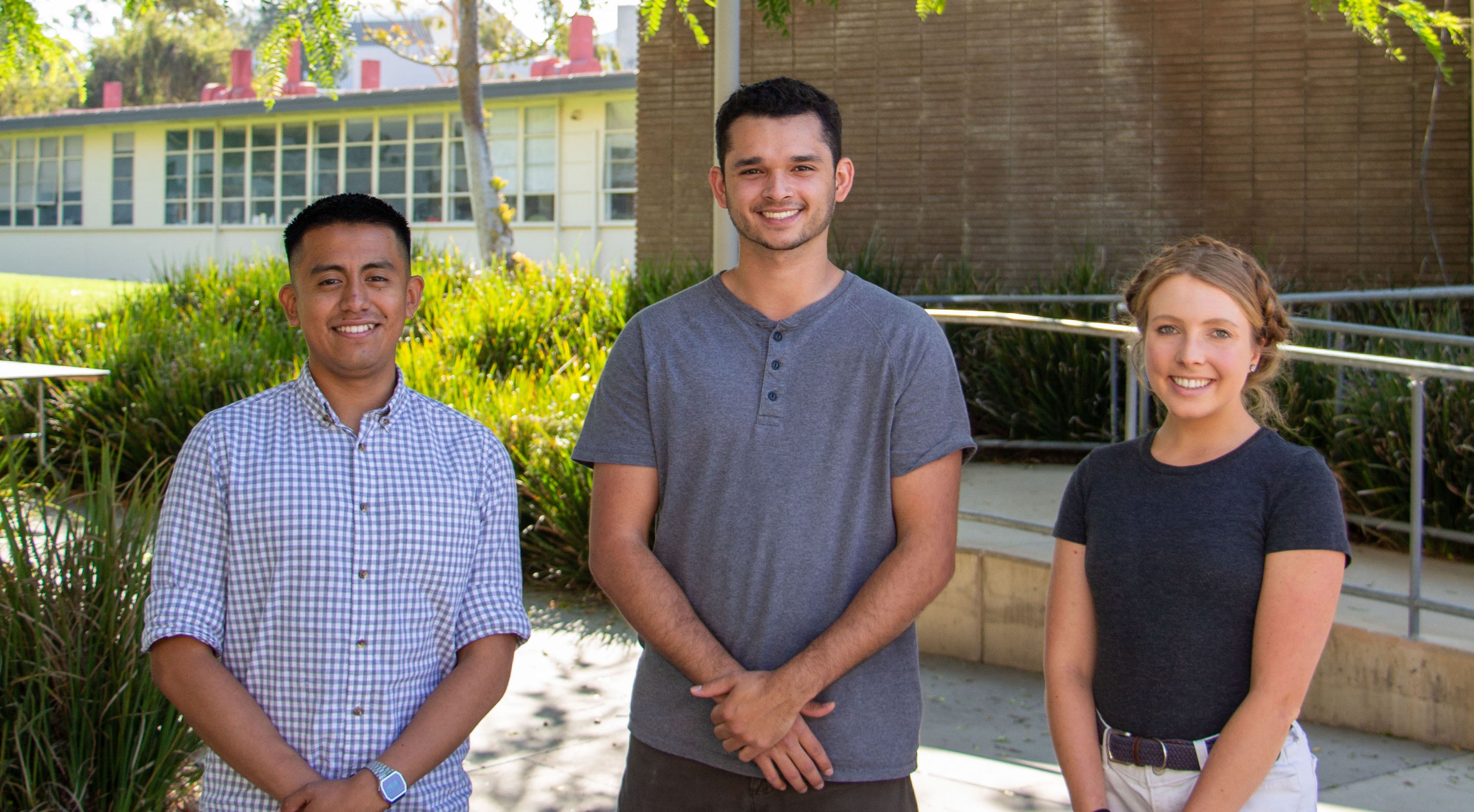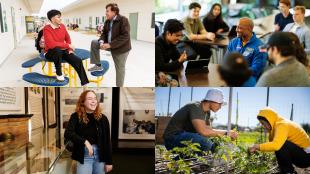‘Creating a More Welcoming Campus.’ Cal Poly Transfers Help Fellow Students Adjust

Jorge Coronel loves helping his fellow students — so much that he worked as a peer coach when he attended Allan Hancock College in his hometown of Santa Maria.
When he transferred to Cal Poly, he saw an opportunity to continue serving others as part of Transfer Academic Coaches, a group of transfer students who provide peer mentoring.
“I’ve always been passionate about education and student success,” said Coronel, a fifth-year agricultural business student. “The transfer coaching role was a perfect fit for me as an opportunity to help.”
The coaches meet with students for one-on-one support, host events and work with staff in the Transfer Center to build out academic support resources for transfer students. The transfer center itself is fairly new, opening in January 2020 thanks to advocacy from students, the Association of Transfer Students, staff and faculty.
The center aims to serve the needs of Cal Poly’s diverse transfer student population while advancing institutional support for transfer students. It offers tools to assist students in achieving their desired personal, community, academic, and professional goals as they progress through their educational journey.
“In opening the Transfer Center, we sought to fill a need for a large group of our students and help them succeed at Cal Poly,” said Beth Merritt Miller, Cal Poly’s assistant vice provost for University Advising.
The transfer coaching program grew out of a partnership between the Transfer Center and the Office of Writing and Learning Initiatives. Heather Domonoske, coordinator for the Transfer Center, and Dawn Janke, executive director of Writing and Learning Initiatives, secured a grant from the California State University focused on supporting new students in order to develop the program.
“Transfer students look to build community with fellow transfer students, and the academic coaching program affords an occasion for doing so,” Janke said, adding that an academic coaching program is common at other universities. “In general, all students benefit from academic coaching sessions, especially those who hope to improve their time management and study skills, adapt to the fast-paced quarter system, and meet the expectations of Cal Poly coursework.”
When recruiting for academic coaches, Domonoske looked for students who could listen and ask questions, were willing to share their own experiences and were eager to understand and connect with the experiences and identities of others.
“Every appointment with a student can go in a wide range of directions,” she said. “Coaches help students find answers, even if it just navigating a building name or number, thus being able to be flexible and an active listener is crucial.”

Most transfer students come to Cal Poly from schools on the semester system, so it can be challenging to adjust to a quarter system, Domonoske said. But academic coaches, having gone through this transition themselves, can use their experiences to help new transfer students adjust.
“I think back to my first quarter quite often. It is such an abrupt shock to go from semester to quarter system, as well as starting upper division classes, and it is difficult to be 100% prepared for how fast paced it is,” said Erik Valdez, a fifth-year aerospace engineering major who is in his second year as a coach.
Valdez, who found community, inclusion and a smoother transition to Cal Poly in organizations such as CORE (Creating Opportunities for Representative Engagement), said he hopes to provide that same sense of inclusivity through his coaching.
“[Becoming an] Academic Coach seemed like the best route! I am able to share my knowledge about on campus resources, study/academic tips I have learned over the years and provide a welcoming environment for all transfers,” Valdez said.
“I hope I can be part of the change that makes transfer students feel more welcome at Cal Poly,” said Aubrey Scheibel, a fourth-year biomedical engineering student in her first year as a coach. “Having the opportunity to talk with transfers and get to know how they’re doing and what they’re working through helps me be a better coach and helps the program know what we need to focus on.
“For me, getting a letter from the Transfer Center the summer before my first quarter at Cal Poly was a very sweet gesture – I hope this is the kind of impact I can make with students I interact with.”
During the first few weeks of the fall quarter, the coaches helped students connect with academic and faculty advisors, find resources in their academic departments, balance their time studying, prepare for multiple classes and get acquainted with Cal Poly’s campus.
“Our coaches recognize that they can’t always provide an answer right on the spot, but they’re all committed to working with a student to find what they need or where they need to go,” said Domonoske. “Sometimes, just saying ‘we’ll help you’ or walking a student to the right resource is exactly what that student needs.”
Coronel added that just checking in on new transfer students can be helpful as they navigate a new environment.
“Sometimes you just need to remind students how to be students,” Coronel said. “Checking email regularly and building rapport with your fellow students or instructors may seem easy to some, but the dynamics can differ at every university or college.”
Another important goal for academic coaches is to be accessible to students, Domonoske said. The coaches host workshops on specific topics that can contribute to transfer success, including time management, making connections with faculty members and study tips.
But because not all transfer students can be in-person for a workshop, they usually also have components on Instagram.
“Many of our transfers have full-time jobs and/or commute to and from campus,” said Domonoske. “It’s important we do our best to reach them where they are.”
There’s also a national push to recognize transfer students: Cal Poly participates in National Transfer Student Week, an annual event during the third week of October that aims to build and support the transfer community — and to challenge assumptions, build empathy and instill transfer pride.
“For many students, it hasn’t been easy to transfer to Cal Poly, but they’ve done it,” Domonoske said. “They bring to us a diversity of lived experiences and identities as well as a knowledge of how things are done on other campus – they’re a tremendous asset to Cal Poly.”
Domonoske hopes that programs like academic coaches and events like National Student Transfer Week can help the community get to know even more about transfer students.
“Getting to work with the coaches and our transfer students in general is an amazingly fulfilling experience. They are a diverse, passionate group of students with an immense dedication to their education,” she said.
Coronel, who plans to continue his education and become a professor, sees his role as a coach as an important learning experience.
“I think it is important for all members of a college campus to be connected with the transfer community, both in and out of the classroom,” he said. “To be a good mentor and a good community member, you need to be aware of the challenges people are facing.”
Transfer students can make in person or zoom appointments with a coach via the Transfer Center website.
For more information on Cal Poly events during National Transfer Student Week, visit https://transfercenter.calpoly.edu/transfer-week.
Don't want to miss any cool Cal Poly News stories? Sign up for our monthly newsletter, the Cal Poly News Recap!




